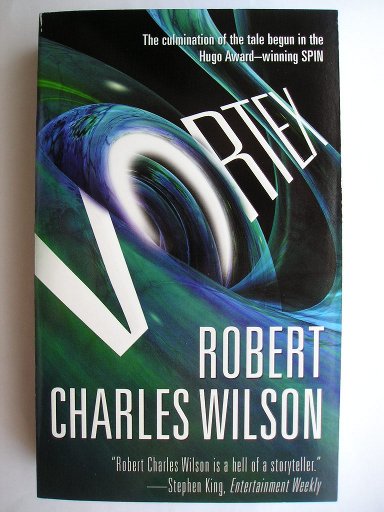
The novel “Vortex” by Robert Charles Wilson was published for the first time in 2011. It’s the third novel in the Spin series and is the sequel to “Axis“.
Sandra Cole works for Texas social services and one day must perform a psychiatric evaluation of Orrin Mather, a boy who was arrested for vagrancy. This is a strange case from the beginning because officer Bose seems interested in the boy instead of just dumping him to Sandra as generally cops do. The greatest strangeness comes from some notebooks in which Orrin wrote a fantastic story set in the future but almost without being aware of it.
Turk Findley and Isaac Dvali were taken by the Hypotheticals and transported ten thousand years into the future. They are welcomed by the Vox community, whose members believe in the prophecy of a contact between humans and Hypotheticals and revere the people who somehow were together with them. To reach the fulfillment of the prophecy, the Vox community moves to the Earth, now dead for a long time after an environmental disaster but Turk doesn’t believe in the prophecy.
In “Spin”, Hugo Award in 2006 as the best novel of the year, Robert Charles Wilson offered us an extraordinary story in which the Earth was wrapped into a membrane that alters the flow of time, giving the illusion that the planet continued through its motions relative to the Sun. For every second passed on Earth, more than three and a half years passed outside it.
in “Axis”, the second novel in the trilogy, the author further develops the story starting to reveal something about the Hypotheticals, the aliens who performed that extraordinary technological deed and actually are a network of machines of various origins. This novel markes the appearance of Turk Findley and Isaac Dvali, who is subjected to a kind of inoculation that is supposed to allow him to connect to the Hypotheticals.
“Vortex” continues in some ways the story of “Axis” but one of the strengths of the Spin series is that Robert Charles Wilson doesn’t just tell a story, however great, but develops various elements in three novels very different from each other. “Spin” takes place on the Earth over several subjective years, “Axis” takes place on a planet colonized using an Arch open by the Hypotheticals in a rather short time, “Vortex” takes place on different planets by telling two parallel stories separated by about ten thousand years.
The use of two parallel stories that take place in two different times is a proven narrative technique but in “Vortex” Robert Charles Wilson uses it in a particular way. The readers, who must have read the two previous novels before starting the third, already know Turk Findley and Isaac Dvali therefore they accept that they were somehow taken by the Hypotheticals and then brought back among humans after ten thousand years. Their story, however, is told by Orrin a few decades after the Spin and the notebooks in which he wrote it are read by Dr. Sandra Cole.
Initially, Sandra thinks that what Orrin wrote is just a fantastic story and only after she realizes the interest totally abnormal of officer Bose, her boss and others for a boy like many others that she starts wondering what’s behind that.
Orrin’s story is a kind of detective story set on the Earth in a period in which the effects of global warming start being heavy. The opening of Archs to other planets by the Hypotheticals allowed many people to emigrate but on the planet Equatoria fossil fuels were found and they’re easily transportable to the Earth, with the inevitable consequences for the climate.
I would’ve enjoyed this part of the novel more if Robert Charles Wilson had developed more the elements of the Earth issues at that time. As it is, it takes a little time to take off and make us understand the mysteries around Orrin and clarify how the boy may know something about future history.
Instead, the story of Turk and Isaac begins with plenty of action when the two are brought back among humans and accepted by the Vox community, a collective in which individuals are somehow linked by neural implants that create a sort of emotional and intuitive consensus.
Even after ten thousand years, humans don’t seem to have really changed despite their advanced technologies. The Vox community is no different from any ideology, religious or not, developed in the past: its members think they’ve created a utopia, they think they’re the best among humans and think they have the right to kill those who don’t subscribe to their ideas.
This part of the novel is told in first person by various characters, not just Turk and Isaac but also Treya, a woman who belongs to the Vox community who was implanted a secondary personality in order to relate better to the two “survivors” from the past. The story set in the twenty-first century is instead told in the third person. The consequence is that in telling the story in the distant future, Robert Charles Wilson focuses even more on the most important elements for the plots.
The characters are well developed in both timelines, an element in common with the two previous novels because in the end the Spin series tells the stories of people in spite of its grandeur and its final apotheosis, which gives a worthy conclusion to a great trilogy.
“Vortex” is overall a very good novel and the people who have read “Spin” and “Axis” should definitely read it while I recommend to the others to buy the whole trilogy.


Permalink